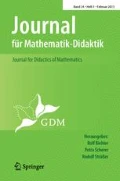Abstract
It is commonly accepted that mathematical concepts are the results of processes of generalization. But there are differing opinions about the structure and the means of these processes and therefore about how concepts are to be taught. A schema for the process of generalization is presented which is based on the view that mathematical concepts like other theoretical conepts represent schematizations and generalizations of human actions (operations) and of relations established and/or intended by these actions. This schema is not descriptive but prescriptive in the sense of the hypothesis that concept acquisition can and should be organized according to the schema. Further it is asserted that the schema itself can be acquired as a cognitive schema or frame which then guides generalization and concept acquisition.
Similar content being viewed by others
Literatur
AEBLI, H.: Denken: Das Ordnen des Tuns. Bd. I und II. Klett-Cotta, Stuttgart 1980/81
BETH, E.W., und PIAGET, J.: Epistemologie Mathématique et Psychologie. Paris 1961
DAVIS, R.B.: Learning Mathematics: The Cognitive Science Approach to Mathematics Education. Ablex Publishing Corporation, New Jersey 1984
DAWYDOW, W.: Arten der Verallgemeinerung im Unterricht. Volk und Wissen, Berlin 1977
DAWYDOW, W.: Über das Verhältnis zwischen den abstrakten und den konkreten Kenntnissen im Unterricht. In: Lompscher, J. (Hrsg.): Probleme der Ausbildung geistiger Handlungen. Volk und Wissen, Berlin 1972
DIÉNÉS, Z.P.: An example of the passage from the concrete to the manipulation of formal systems. Educational Studies in Mathematics 3(1971), 337–352
DÖRFLER, W.: Entwicklung formaler Qualifikationen im Mathematikunterricht (EFQUIM-Projekt) Teil I: Theoretische Grundlagen. In: Beiträge zum Mathematikunterricht 1983, pp. 91–94, Franzbecker, Bad Salzdetfurth 1983 a
DÖRFLER, W.: Models for the process of mathematical generalization. In: Proc. 7th Int. Conf. Psychology of Mathematics Education, pp. 57–62, Rehovot 1983 b
DÖRFLER, W.: Taschenrechner und mathematische Reflexion. In: JMD 5 (1984), Heft 3, 1984b
DÖRFLER, W.: Actions as a Means for Acquiring Mathematical Concepts. In: Proc. 8th Int. Conf. Psychology of Mathematics Education, pp. 172–180, Sydney 1984a
DÖRFLER, W., und PESCHEK, W.: Entwicklung formaler Qualifikationen im Mathematikunterricht, Projektbericht ’83. Klagenfurt 1984
FREUDENTHAL, H.: Major Problems of Mathematics Education. Educational Studies in Mathematics 12(1981), 133–150
FREUDENTHAL, H.: Soviet Research on Teaching Algebra at the Lower Grades of the Elementary School. Educational Studies in Mathematics 5(1974), 391–412
HERSCOVICS, N., und BERGERON, J.C.: Models of understanding. ZDM 15/2(1983), 75–83
KRUTETSKII, V.A.: An Analysis of the Individual Structure of Mathematical Abilities in Schoolchildren. In: Kilpatrick, J. und Wirszup, I.: Soviet Studies in the Psychology of Learning and Teaching Mathematics, Vol. II. University of Chicago Press, Chicago 1969
KRUTETSKII, V.A.: The Psychology of Mathematical Abilities in Schoolchildren. University of Chicago Press, Chicago 1976
LOMPSCHER, J.: Psychologische Aspekte der Ausbildung der Lerntätigkeit nach der Lehrstrategie des Aufsteigens vom Abstrakten zum Konkreten. In: Beiträge zum Mathematikunterricht 1982, pp. 58–67. Schroedel Verlag, Hannover 1982
PAPERT, S.: Mindstorms: Kinder, Computer und Neues Lernen. Birk-häuser-Verlag, Basel 1982
PESCHEK, W.: Entwicklung formaler Qualifikationen im Mathematikunterricht (EFQUIM-Projekt) Teil II: Schülerinterviews zum Verallgemeinern. In: Beiträge zum Mathematikunterricht 1983, pp. 240–243. Franzbecker, Bad Salzdetfurth 1983
PESCHEK, W.: Kognitive Strukturen und deren Veränderung durch Handlungsvorstellungen. Erscheint in: Empirische Untersuchungen zum Lernen und Lehren von Mathematik. Schriftenreihe Didaktik der Mathematik, Hölder-Pichler-Tempsky und Teubner, Wien/Stuttgart, 1985
RUBINSTEIN, S.L.: Das Denken und die Wege seiner Erforschung. Deutscher Verlag der Wissenschaften, Berlin 1972
RUBINSTEIN, S.L.: Sein und Bewußtsein. Akademie Verlag, Berlin 1973
Author information
Authors and Affiliations
Rights and permissions
About this article
Cite this article
Dörfler, W. Verallgemeinem als zentrale mathematische Fähigkeit. JMD 5, 239–264 (1984). https://doi.org/10.1007/BF03339248
Published:
Issue Date:
DOI: https://doi.org/10.1007/BF03339248




